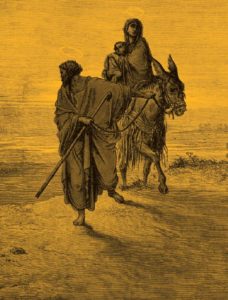By Dr. Leila S. Al-imad
 Reflecting on having joined the Mexican community in the Las Posadas, I was thrilled to have seen how uplifting their affirmation of faith is and how devoted they are to our Catholicism.
Reflecting on having joined the Mexican community in the Las Posadas, I was thrilled to have seen how uplifting their affirmation of faith is and how devoted they are to our Catholicism.
I was inspired by their enthusiasm and genuine love for their religion. What a joy to have heard them sing.
I also reflected on the fact that many of them are refugees and immigrants to the “land of plenty” and how lacking we are in welcoming them with open arms and celebrating with them, especially as we awaited the coming of our Lord.
Their journey crossing into the “Promised Land” must have been hard and they surely must have been scared. How traumatic it must have been for the majority of those who crossed, maybe illegally, in search of a better life for them and their children.
Their journey on foot or in the back of trucks at night or in the heat of the day must have left a mark on them. And if they made it, like many of them did, they did it to escape the bad circumstances they lived under.
If only we would venture to ask them about the paths they took to reach the United States and about their trials and tribulations in their newfound country and their homeland, we might become more sympathetic to their plight and we could establish a common cause with them to help them become our best neighbors.
In the same manner, we should reflect on the journey that Joseph and Mary took, carrying the Infant Child to an unknown land, leaving their hometown with as few belongings as they could carry on their backs or on their donkey’s back. The journey to Egypt through the arid land of an unforgiving desert in the heat of the day or the chillness of the night, frightened by the prospect of being caught, was probably extremely traumatic.
Once they made it to Egypt, the land that was to become Jesus’ refuge in his formative years, we can reflect on the trials of a mother and a father who probably could not speak the language, nor did they have any support system in their new abode.
What a dedicated couple they were to take such a journey with its potential disasters to save their child, our Lord. Did they have money, or were they at the mercy of those who were charitable among the Egyptians to give them food and shelter?
Although Joseph was a carpenter by trade, was he able to find a job? If so, how long did it take him to find one? How desperate were they?
Maybe they were able to do it all, the Lord only knows. We all know, on the other hand, that making a decision to abandon all of one’s worldly treasures does not happen without regrets and anguish. As strangers in a strange land, with or without money, they must have been afraid and scared. … Their only refuge was their Lord in whom they trusted, and the Egyptians, who opened their arms to take this Holy Family and give them shelter and food.
Should they not be an example for all of us in the 21st century to become more hospitable and to invite those less-fortunate refugees and immigrants in our midst to become our guests, where they can partake of our hospitality and generosity?
Let us help those who are afraid of what the future holds for them. Let us listen to their stories and affirm them and validate their culture as they are enriching ours.
Dr. Leila S. Al-imad is a professor of Islamic and Middle Eastern history at East Tennessee State University and a parishioner of St. Mary Church in Johnson City.
